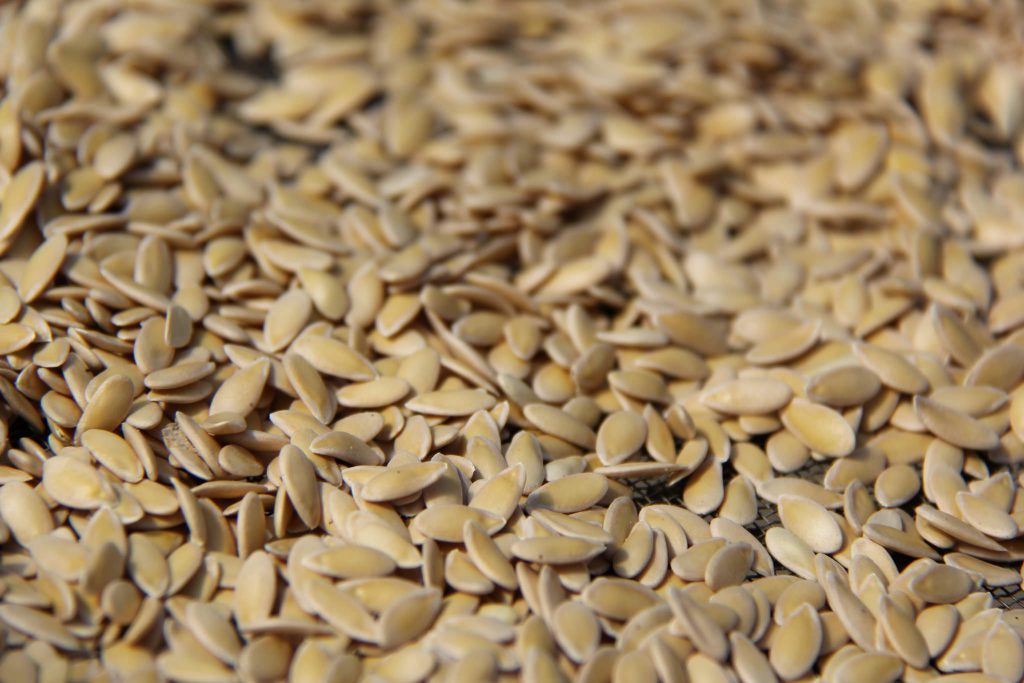 Organic Seed Alliance (OSA) envisions an organic food system built on a foundation of organic seed. The purpose of the State of Organic Seed project is to measure progress in achieving this goal. (View the full 2022 report here.)
Organic Seed Alliance (OSA) envisions an organic food system built on a foundation of organic seed. The purpose of the State of Organic Seed project is to measure progress in achieving this goal. (View the full 2022 report here.)
The USDA’s National Organic Program (NOP) requires the use of organic seed when commercially available. However, the organic seed sector was almost nonexistent when the program began and is still working to meet demand. Meanwhile, the organic food industry continues to experience fast growth, with sales toppling $56 billion in 2020 (a 12% increase compared to 2019).
As demand for organic products grows, so does demand for organic seed. As this report shows, there remain gaps in the organic seed supply and challenges to filling these gaps.
Make no mistake: the benefits of organic seed go well beyond helping organic farmers meet a regulatory requirement. Organic seed systems that respond to the needs of farmers broadly benefit the sustainability of our food and agricultural systems. (See Why organic seed?)
Unfortunately, most organic producers still source non-organic seed for part (if not all) of their operation. Our data shows no meaningful improvement in organic producers using more organic seed.
We arrived at this conclusion through a number of surveys and interviews with targeted stakeholder groups, a detailed analysis of organic seed research investments, and focus groups at organic farming events. Below is a snapshot of some of our key findings.
Here’s the good news:
Small-scale organic vegetable growers are planting more organic seed
Organic seed usage in vegetable, field, cover, and forage crops remains stagnant compared to 2016 data. The one exception is that we saw an increase in organic seed usage among smaller scale vegetable producers (less than 50 acres).
Organic farmers believe organic seed is important to the integrity of organic food
Our findings show that most organic farmers agree that organic seed is important to organic integrity and that having seed that’s bred under organic conditions is important to their success and that of the broader organic industry. It’s broadly accepted that organic farms provide different growing environments from their conventional counterparts. Organic plant breeding therefore has the potential to provide seed that’s more optimal for organic agriculture.
Organic plant breeding investments continue to increase
Public investments in organic plant breeding and other organic seed initiatives have increased by $39.8 million in the last five years alone ($22 million was documented in our 2016 report and a mere $9 million in our 2011 report). Our 2022 finding represents the largest public investment in organic seed systems over a five-year period ever recorded. More organic plant breeders also report having success releasing new varieties.
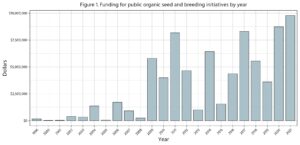
The largest three sources of funding include USDA’s Organic Research and Extension Initiative (OREI) and Sustainable Agriculture and Research Education (SARE), and other federal funding programs. The vast majority of funding supported organic plant breeding and variety trials as opposed to other areas, such as organic seed production research. By crop type, vegetable and field-crop projects received the largest amount of support.
Organic seed networks mostly reflect an evolution toward resilience
When envisioning a resilient seed system, seed producers want to see decentralized regional communities of seed growers that can work together to share knowledge, access markets, and maintain diverse, productive, and adapted seed. The current structure of the seed network mostly reflects this vision of a resilient seed system, but regions other than the West are still small, and resources along the supply chain could stand to be diversified.
Here are the challenges that remain:
Most organic farmers still rely on conventional seed
Most organic farmers responding to our survey still rely on conventional (non-organic) seed for at least part (if not all) of their operation. There are a number of reasons why, including specific varieties that are unavailable in an organic form, insufficient quantities in seed, and a lack of desirable traits. Our most recent findings show an increase in organic producers identifying process/buyer contracts as a barrier to sourcing organic seed (i.e., a buyer contract dictates a specific variety be grown, and too often it isn’t available as organic.)
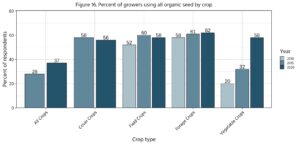
There was no meaningful growth in the numbers of organic producers using all organic seed (i.e., 100 percent of the seed they source is organic) compared to our 2016 findings. Of those responding, 27 percent reported using all organic seed compared to 28 percent in 2016 and 26 percent in 2011.
The largest operations still use relatively little organic seed
The largest organic operations still use relatively little organic seed, and this has a big impact on overall acres planted to organic seed. Our most recent organic producer survey data shows a consistent decrease in the percent of organic seed used as vegetable acreage increases. The data also points to less organic seed used by the largest (more than 480 acres) field crop producers. On the plus side, we saw an increase in organic forage seed usage by large (more than 160 acres) forage crop producers.
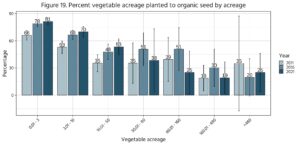
Data also points to larger scale vegetable producers (more than 50 acres of vegetable crops) identifying the following factors for not using organic seed more than other larger scale crop producers: lack of seed treatments, buyer requirements, and insufficient quantities of seed in organic form. The lack of specific traits in organic varieties was more of a factor for larger vegetable, field crop, and forage crop producers, and distrust of organic seed quality showed up as more of a factor for larger field crop producers (more than 80 acres of field crops).
Organic certifiers could do more to support organic seed
Organic certifiers play an important role in supporting the expansion of organic seed systems by enforcing the organic seed requirement in a measurable and reasonable way. Our findings show a marked decrease in the percentage of organic certifiers asking organic farmers to improve their sourcing of organic seed. Only 35% of farmers said their certifiers made such a request whereas 40% reported this request in our 2016 report and 61% in our 2011 report. We found, as we did in our previous reports, that when certifiers request that producers take extra measures to source organic seed, they respond accordingly. Our findings also show that most certifiers support strengthening the organic seed regulation.
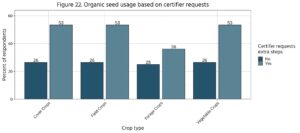
Organic seed producers need more support
Producing organic seed takes experience and a special skill set, and organic seed companies report a dearth of skilled and reliable producers. Though it’s encouraging that our findings show an interest among organic farmers to take organic seed trainings, other challenges remain, including access to seed processing equipment, labor, and production data (e.g., seed yield data). There’s a need to provide more educational trainings and resources to build our organic seed production capacity here in the US.
Our 2022 report provides a deeper examination of the challenges that organic seed producers/companies experience. Our survey asked these producers to rate the seriousness of their production and field management challenges as well as non-production challenges, such as social, economic, and policy issues. The greatest challenges that seed producers identified are ranked in the figures below.
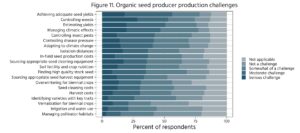
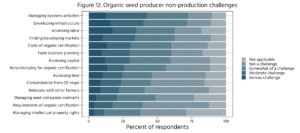
Fewer organic farmers are saving/producing seed
Increasing the availability of organic seed will require training more organic seed producers, which is why it’s encouraging that nearly 40 percent of organic farmers responding to our survey say they’re interested in producing seed commercially. However, our findings showed a marked decrease in organic farmers saving their own seed or producing seed to sell.
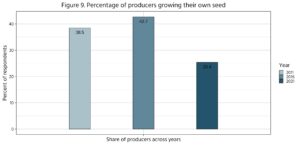
Organic seed research investments are insufficient
An increase in organic seed research investments is encouraging, to be sure. But these investments still pale in comparison to funding for non-organic research. Research focused on chemical agriculture often doesn’t benefit organic farmers who can’t rely on spray-on solutions for pest and disease challenges. Organic plant breeding and other organic seed research, on the other hand, prioritizes key traits important to organic farmers (e.g., disease resistance and drought tolerance) that typically also benefit conventional producers.
Organic seed producers and researchers are concerned about utility patents
Intellectual property rights (IPR) on seed are of critical concern to plant breeders, seed producers, and the communities they feed. It has only been over the course of a few decades that highly restrictive forms of IPR have expanded. One of these tools—utility patents (i.e., patents for invention)—were generally first awarded for products of genetic engineering. Today, utility patent owners brazenly claim ownership to thousands of non-GMO plants and traits, from finished lettuce varieties to phenotypes (“pink tomatoes”) and genetic traits (“heat-tolerance”). Below is a snapshot of organic seed producers’ and researchers’ perspectives on various IPR strategies.
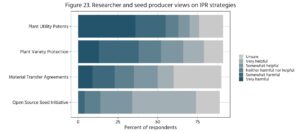
Risks to organic seed integrity remain
Genetic engineering (GE) is an excluded method in the organic standards. Organic farmers who grow crops with a GE counterpart, especially corn, are increasingly challenged by the proliferation of GE traits in their seed and crops. Biotechnology regulations are weak, and don’t require that the owners and users of GE crops implement strategies to mitigate pollen and other means of contamination. Meanwhile, organic farmers are required to take measures to protect their fields from prohibited substances and excluded methods, including GE material. This burden comes at a great cost.
The seed industry continues to consolidate
The seed industry continues to rapidly consolidate, and some of the biggest mergers have occurred since our 2016 report. Intellectual property rights (e.g., utility patents) that provide complete control over much of the commercial seed supply are in part to blame, as are regulators who allow anticompetitive mergers. The organic community has an opportunity to create a different path for organic seed: one that emphasizes healthy competition, shared benefits, and the time-honored right to save seed. Seed is a living, natural resource that’s too important to be locked under restrictive intellectual property rights and managed by a handful of chemical companies.
Climate change is severely impacting organic seed growers
Organic seed producers (more than 70 percent) reported extreme weather events and unpredictable changes in their climate as a major challenge. These growers pointed to wildfire smoke affecting pollination and seed production, destructive winds and unpredictable freezes, and the lack of adequate rainfall. Policy actions and research investments are needed to mitigate the impacts and increase the climate robustness of our crops and seed systems.
Recommendations
Organic seed systems, like all seed systems, involve the essential practices of breeding, production, and distribution. The quantity and quality of organic seed delivered to farmers is the result of many stakeholders working together. Stakeholders include seed growers/savers, plant breeders and other agricultural researchers, organic certifiers, seed companies, policy advocates, food justice advocates, organic food companies, and the farms planting organic seed, to name just some. No single stakeholder group can address the diverse seed needs of growers alone. When actions are guided by shared values, the progress is faster, more coordinated, and longer lasting.
A longer list of recommendations can be found in the conclusion of the report. We hope these recommendations will serve as an action plan for increasing the organic seed supply while fostering seed-grower networks and policies that aim to decentralize power and ownership in seed systems. The recommendations that stand out as most timely include:
- Public research investments in organic plant breeding and seed initiatives should continue to increase. Research agendas should also be diversified to prioritize seed- producer challenges identified in this report.
- Train more organic seed producers and support existing producers to ensure that organic seed production capacity continues to grow in the US.
- The organic seed regulation should be strengthened and consistently enforced, regardless of farm size, and buyers/processors who contract with organic producers to use specific varieties should be held accountable to the organic seed regulation.
- Organic seed stakeholders should advocate for policy initiatives that aim to decentralize power in agriculture and advance equity and justice within food and farm policies, programs, and leadership.
We can grow a healthier future beginning with organic seed – but not without you. Join us!